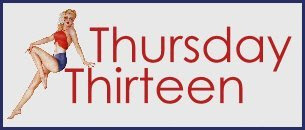- Mind your P’s & Q’s ~ It actually means, Mind your Pints and Quarts. In Pubs when people would start arguing, the bartenders would tell them to mind their own drinks… being pints n quarts!
- Back To Square One ~ Meaning back to the beginning. This idiom was first heard on football radio commentaries during games. Football isn’t easy to commentate on on the radio so they had the idea of splitting up the field into notational numbered squares so that listeners could be told where the ball was. Whenever the game restarted after a break it was ‘back to square one’.
- Jaywalk ~ Dates back to 1884 meaning an annoying or stupid person. Later evolved to mean crossing in the middle of the street because anyone who walked into traffic was not considered too smart.
- Kilroy was here ~ Kilroy was actually a goods inspector for the army and that was his signature way of marking something as “inspected.”
- Knock Someone Down A Peg ~ This originates from the days of prohibition in the US. A peg was a measurement of alcohol and the saying has something to do with drinking games. Presumeably it was respectable to down more pegs and someone who was very proud or boasted would need knocking down a peg or two.
- Loose Cannon ~ This idiom originated when ships were damaged due to unsecured cannons rolling around on deck. Today, the term can mean anything unpredictable.
- Raining Cats & Dogs ~ in old England, they had hay roofs on their houses and the cats and dogs would sleep on the roof. When it rained, the roofs got slippery and the cats and dogs would slide off of the roofs. There for it was “Raining Cats and Dogs” or possibly it stems from the Norse Mythology. Cats were believed to represent the wind and dogs represented rain. Different animals represented different weather and natural phenomenon.
- Devil’s Advocate
The word “Devil’s Advocate” actually comes from Canon Law. In the Vatican, when arguments are being presented to have a person declared a saint, the Church appoints an official to find flaws in this evidence. This official is called the “Devil’s Advocate” and has come to mean a person who espouses a cause just for the sake of argument. - COCK & BULL STORY In England there were many, many pubs, the most popular names of pubs being The Cock and The Bull. By the time a story had travelled along the roads, from pub to pub, Chinese Whispers had taken effect. I am not sure it doesn’t even date back to Chaucer and the Inns used by travelers, where news only traveled by means of word of mouth from Inn to Inn, and unsavoury and elaborate stories abounded. The difference being, it was not just a couple of pubs in a village, but many pubs, all over the country, from town to town. I don’t think merely being heard in two pubs is “enough” for a Chinese whisper to be fully “Cock and Bull” in nature. I also heard a similar story but the pubs were all along a certain road in London, not sure which. Another slant is that is means the kind of story someone gives to cover up the truth, “an elaborate Cock and Bull story”.
- Cup Of Joe
According to the June 2004 issue of Sea magazine (volume 96, no. 6, page 22): When Josephus Daniels became secretary of the Navy in 1913, he prohibited alcohol aboard all U.S. Navy vessels – making coffee the strongest drink that could be served on board. For that reason, sailors started referring to a mug of strong coffee as “a cup of Joe”. - Three Sheets to the Wind
Refers to when someone has had too much to drink and is therefore unsteady. When I visited Nantucket Island – which has several windmills, that the operators would adjust the number of sails dependent upon how strong the winds were. One rule that they had to follow was to always keep an even number of sails (either 2 or 4), opposite each other so that the windmill remained balanced. If they ever had 3 sheets, the windmill became unbalanced and extremely wobbly and unsteady. - Who Let The Cat Out Of The Bag
The origins of this phrase come from when farmers would sell chickens at market. Most of the time they would just throw the chickens in a bag and sell them as however many were supposidly in there. But cats were cheaper than chickens so many times farmers would put a cat into the bag with the chickens and if someone suspected something they would open the bag. At that point the cat would jump out of the bag, thus giving away the secret. Eventually the duped customers would open their burlap bags revealing the cats and thus “letting the cat out of the bag”. This expression is often used when the real truth has been revealed. - Scapegoat
A scapegoat is someone who gets the blame for a scandal/mistake; typically, the scapegoat is either completely innocent, or at least is only one of many guilty people. This originates from the Old Testament of the Bible, in which a goat was sent into the wilderness for the sins of its owner. Lev 16:10: “But the goat on which the lot for the scapegoat fell shall be presented alive before the LORD, to make atonement upon it, to send it into the wilderness as a scapegoat.”



WOW! Too cool! I have learned a lot of things new today! I say a lot of these phrases, but I sure didn’t know where they originated! Thanks for this list!
This was really interesting. I didn’t know some of them.
LOVE this—Cup of Joe I’ve always wondered. Great post!
Came over here from Stephanie’s place and thought I’d at least say “HI”! ~ jb///
Fun TT! And I just noticed your recipes, too! They look yummy!
*hugs*
Paige
My TT is at http://paigetylertheauthor.blogspot.com/
These are neat.. Thanks so much..I learned some things.. have a great day.
Very interesting TT. I really enjoyed reading it. Happy TT